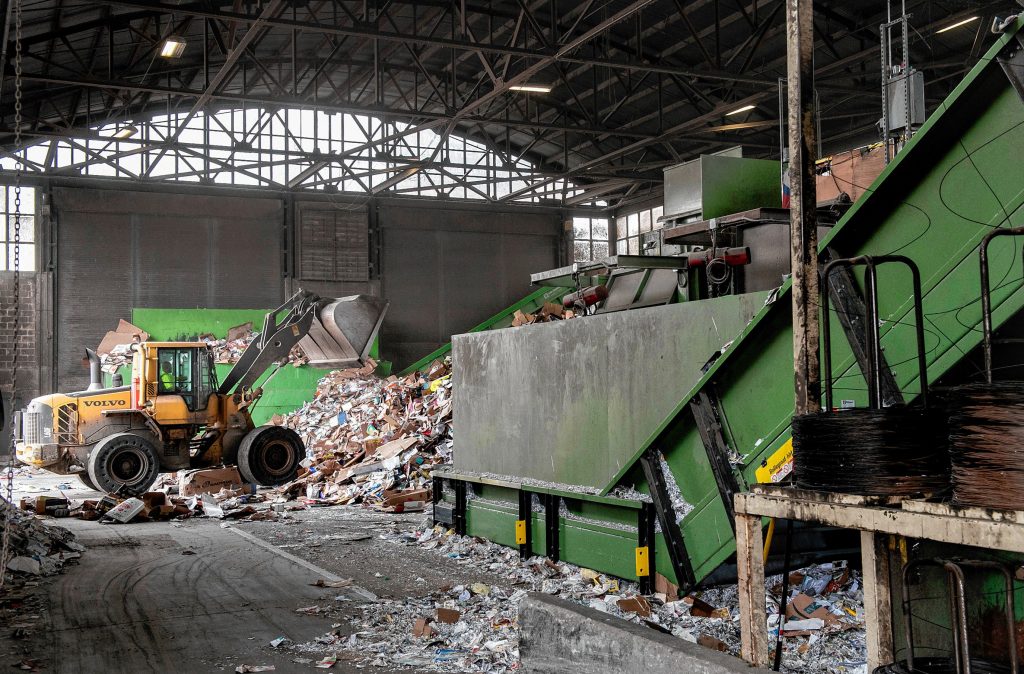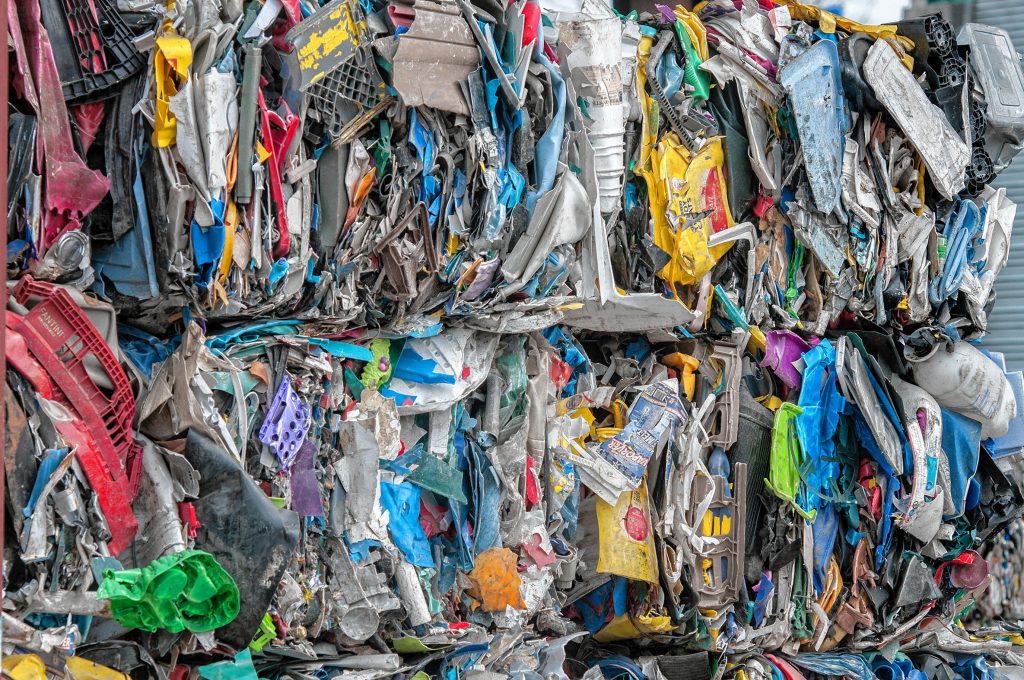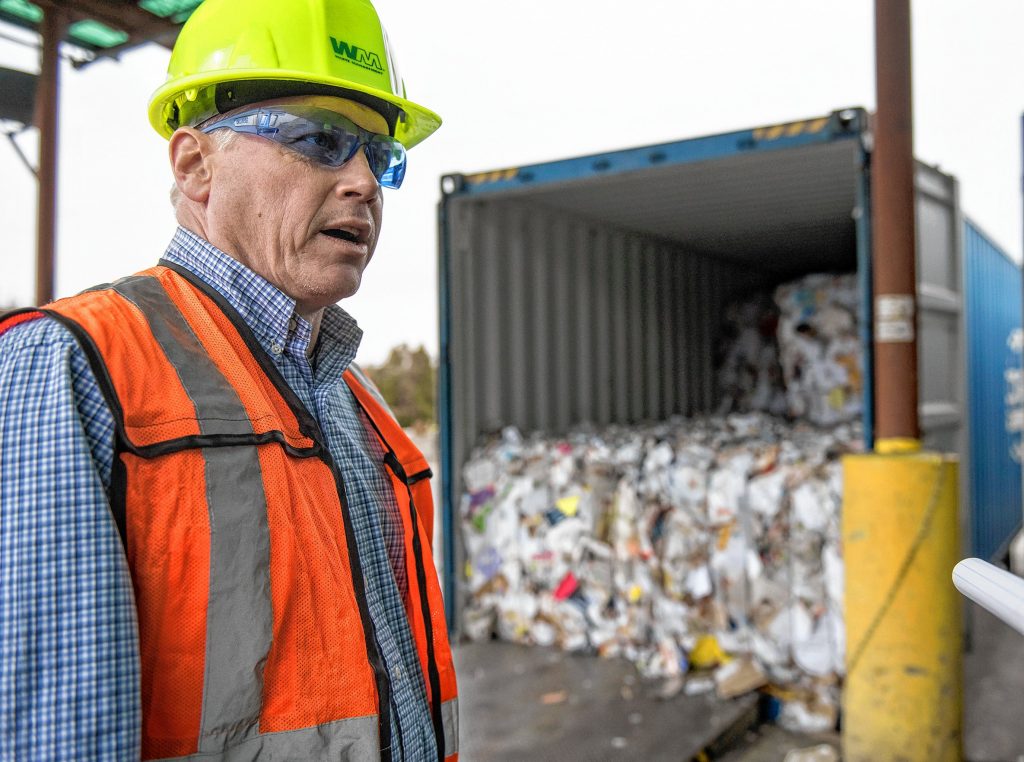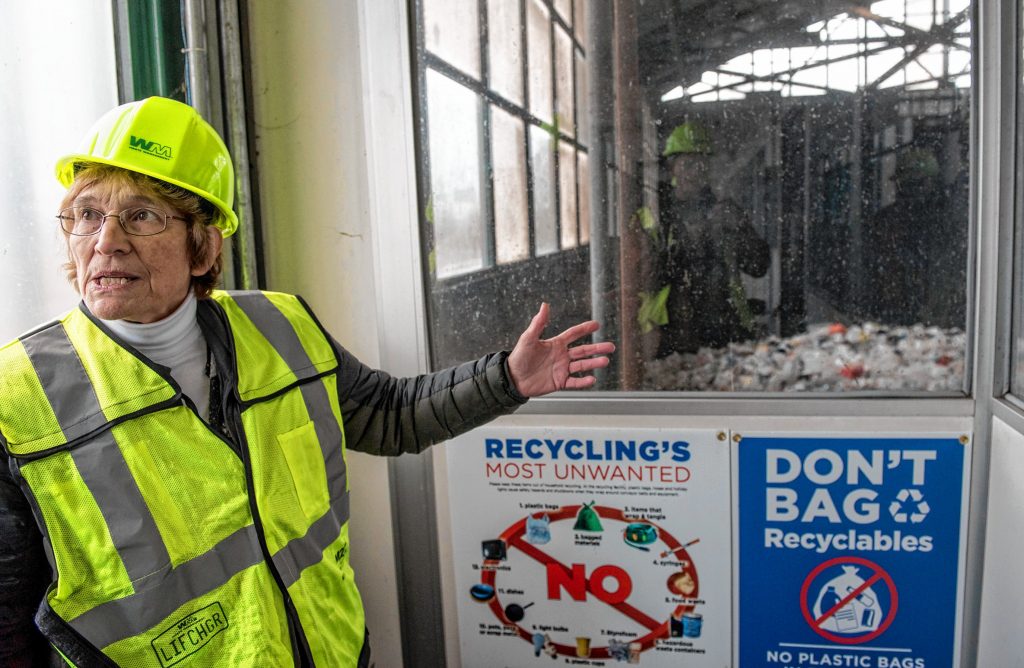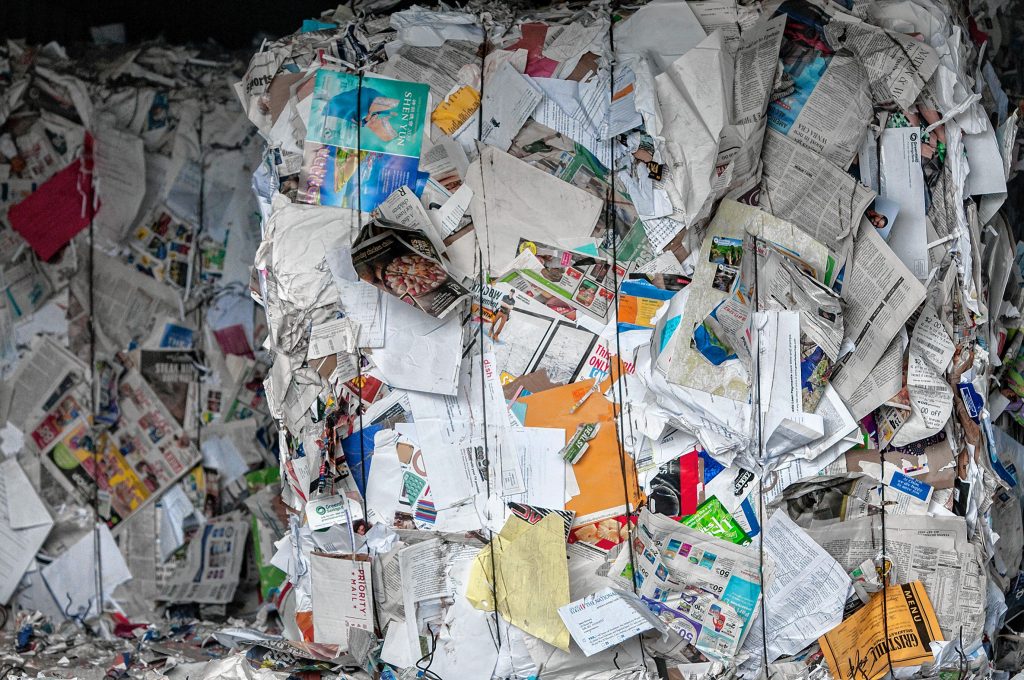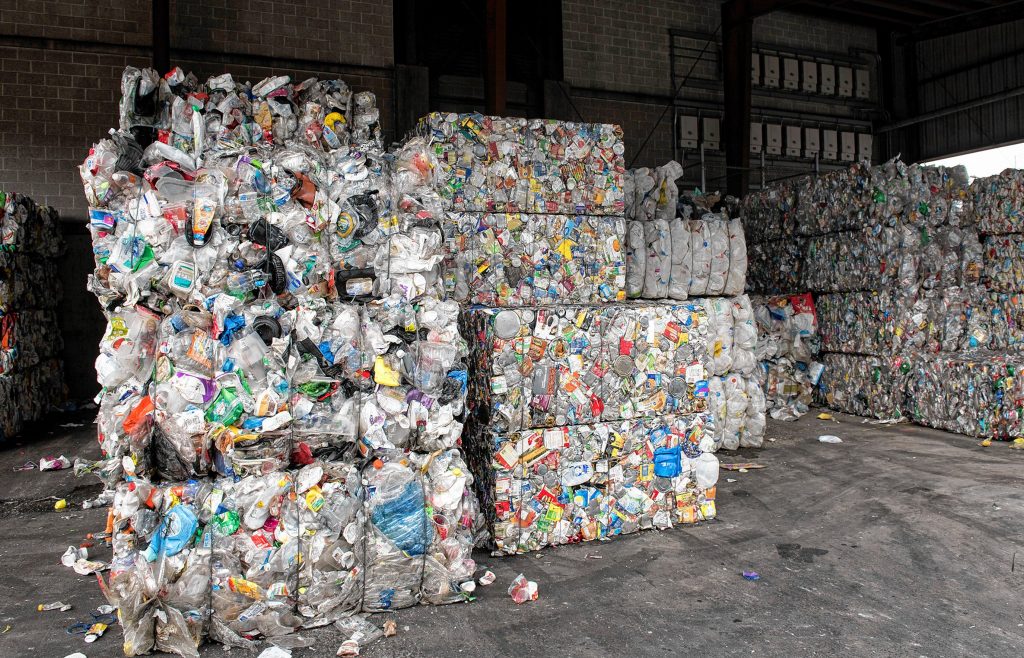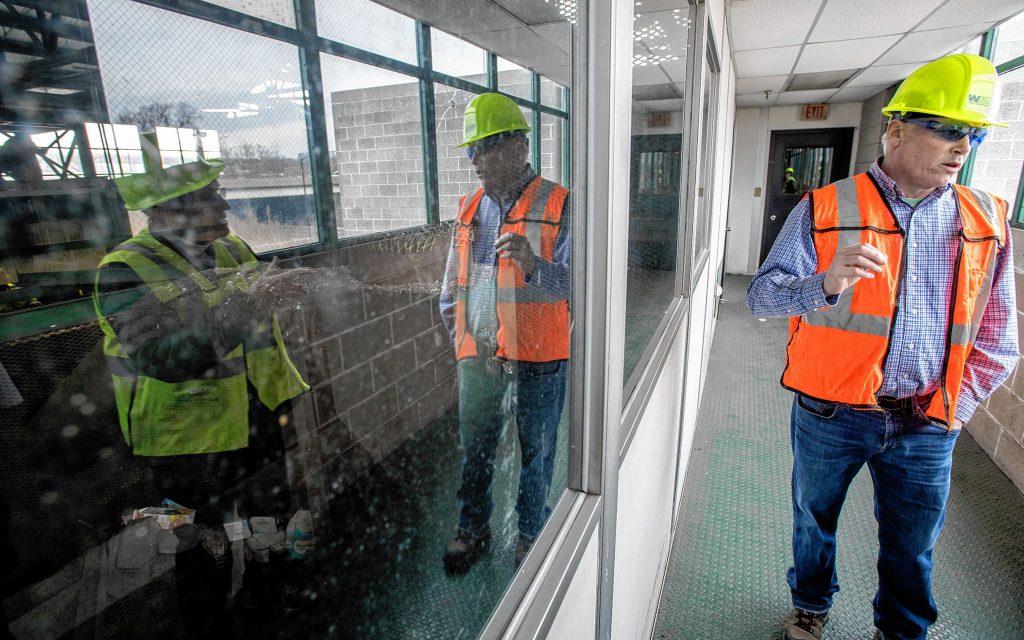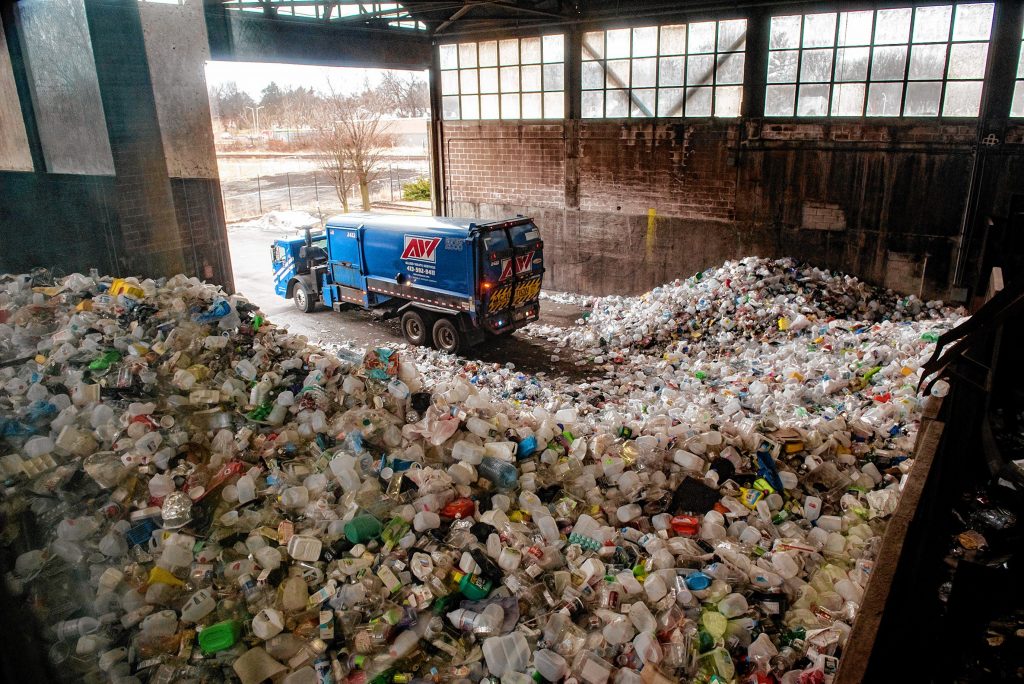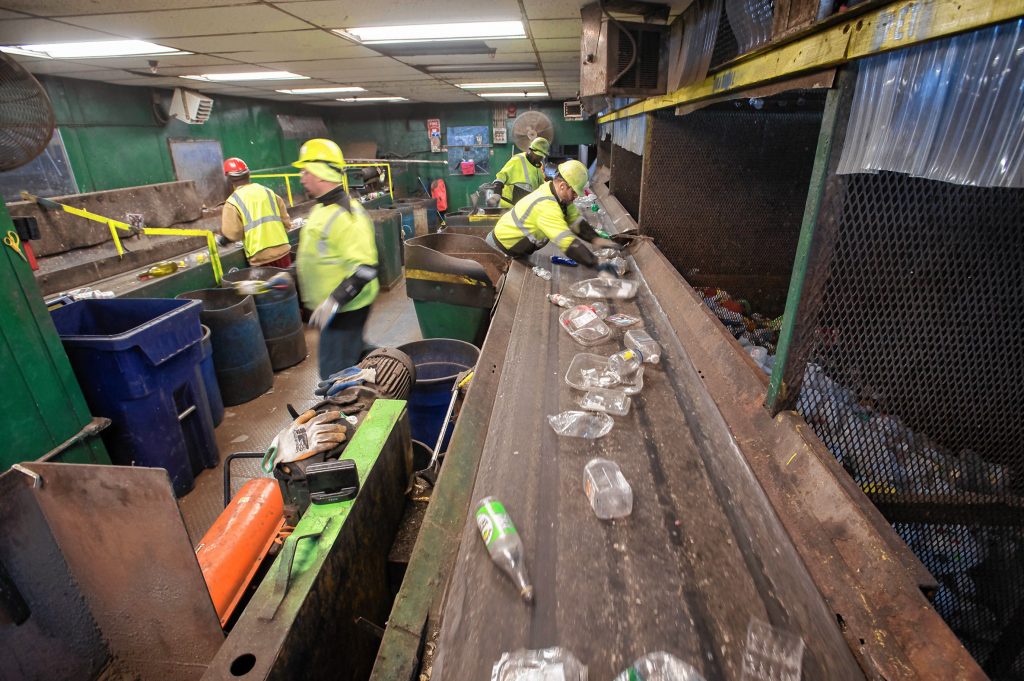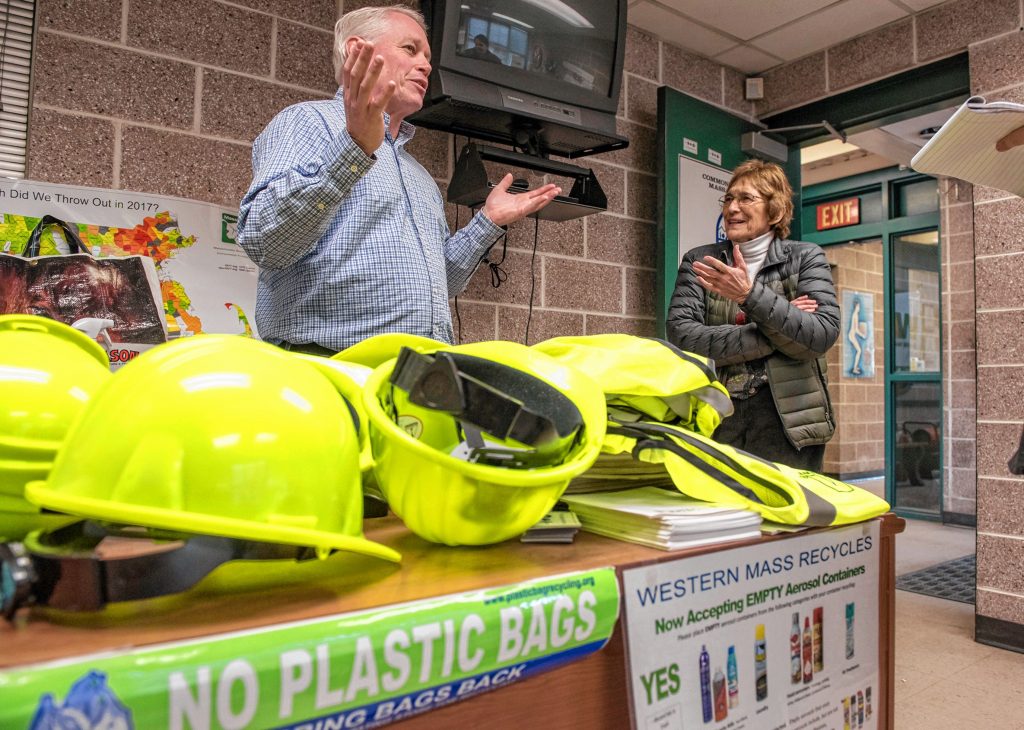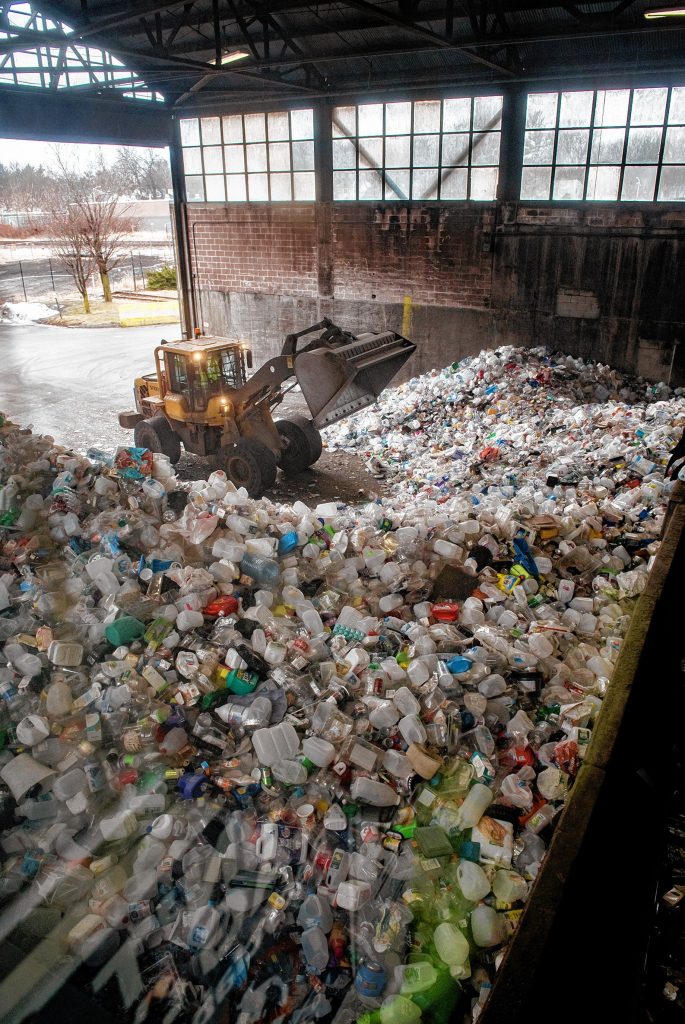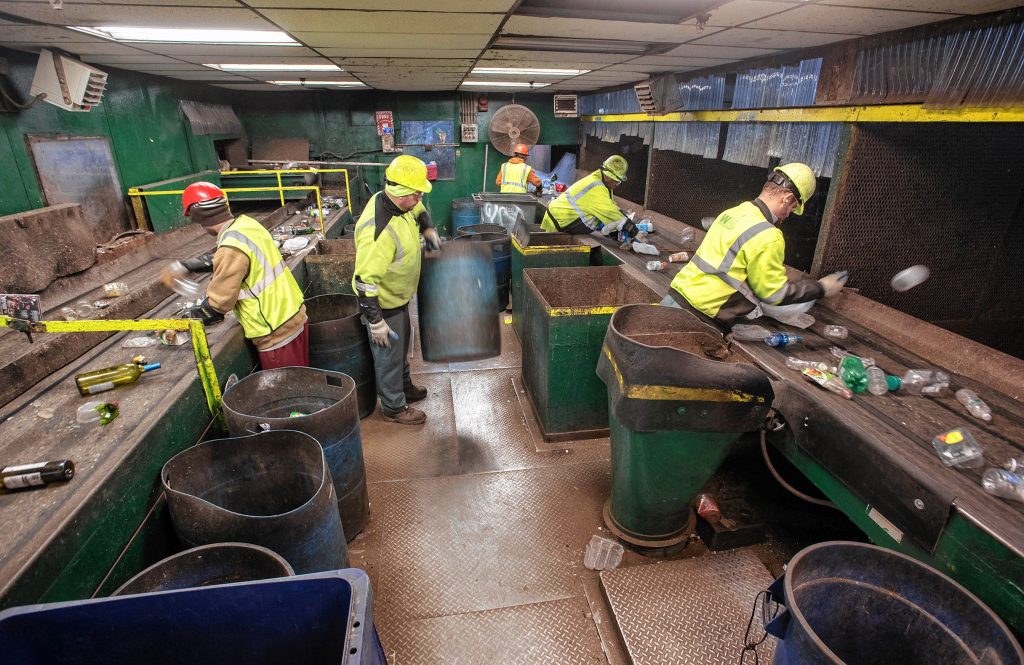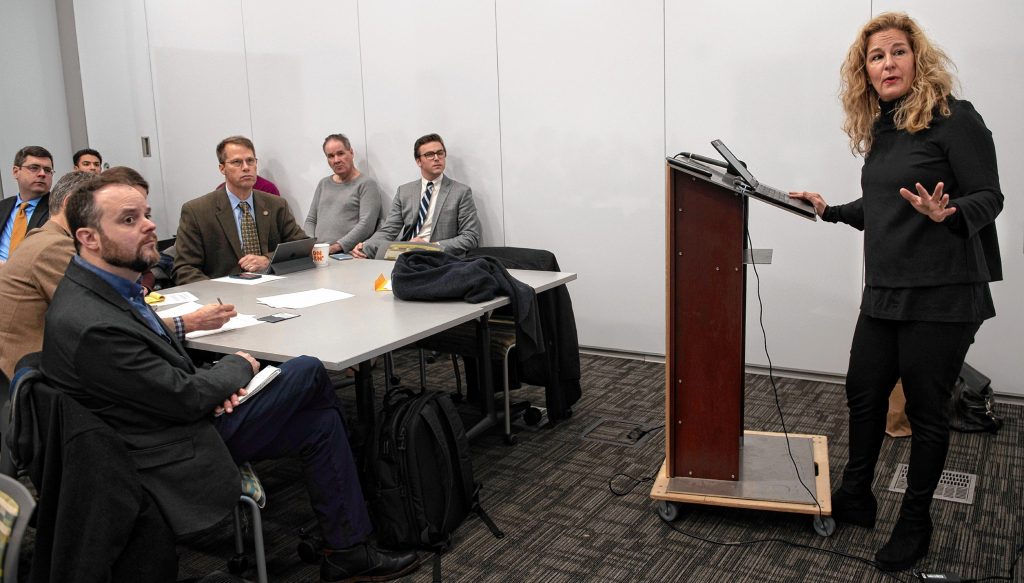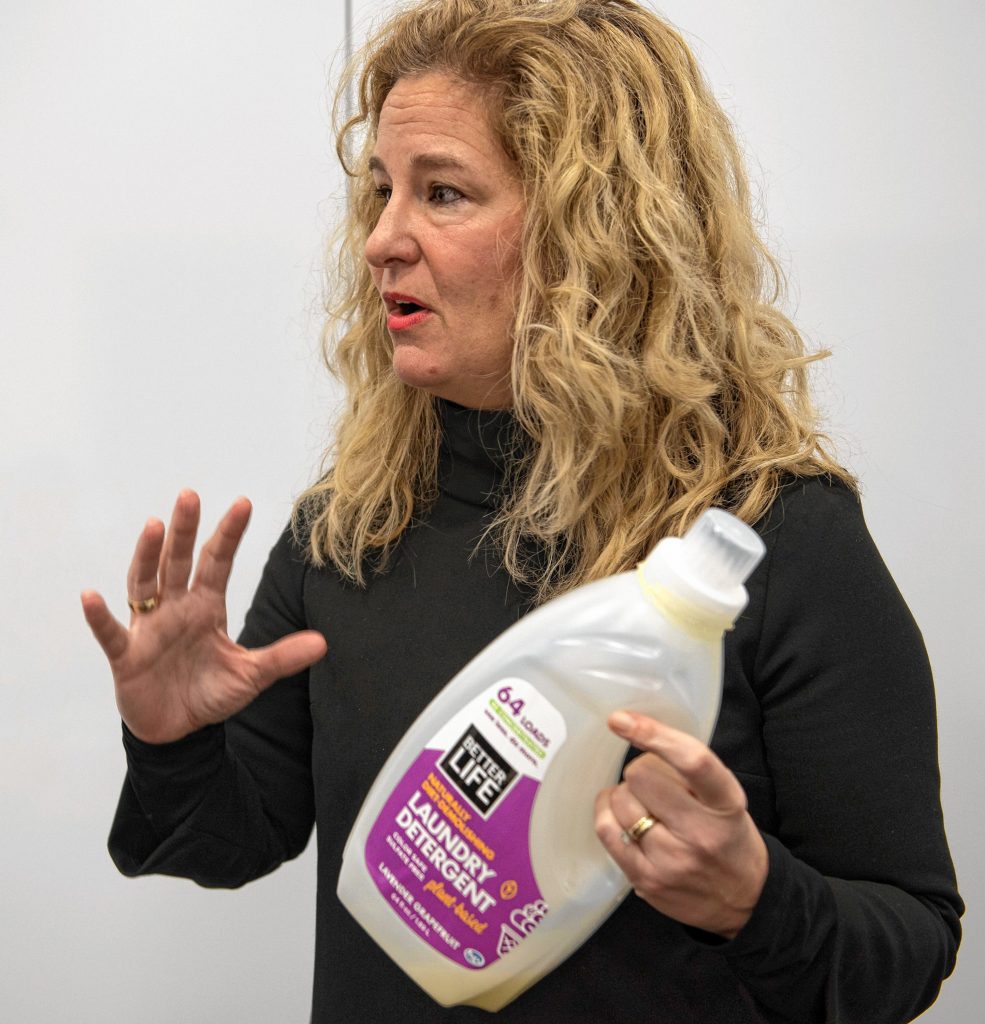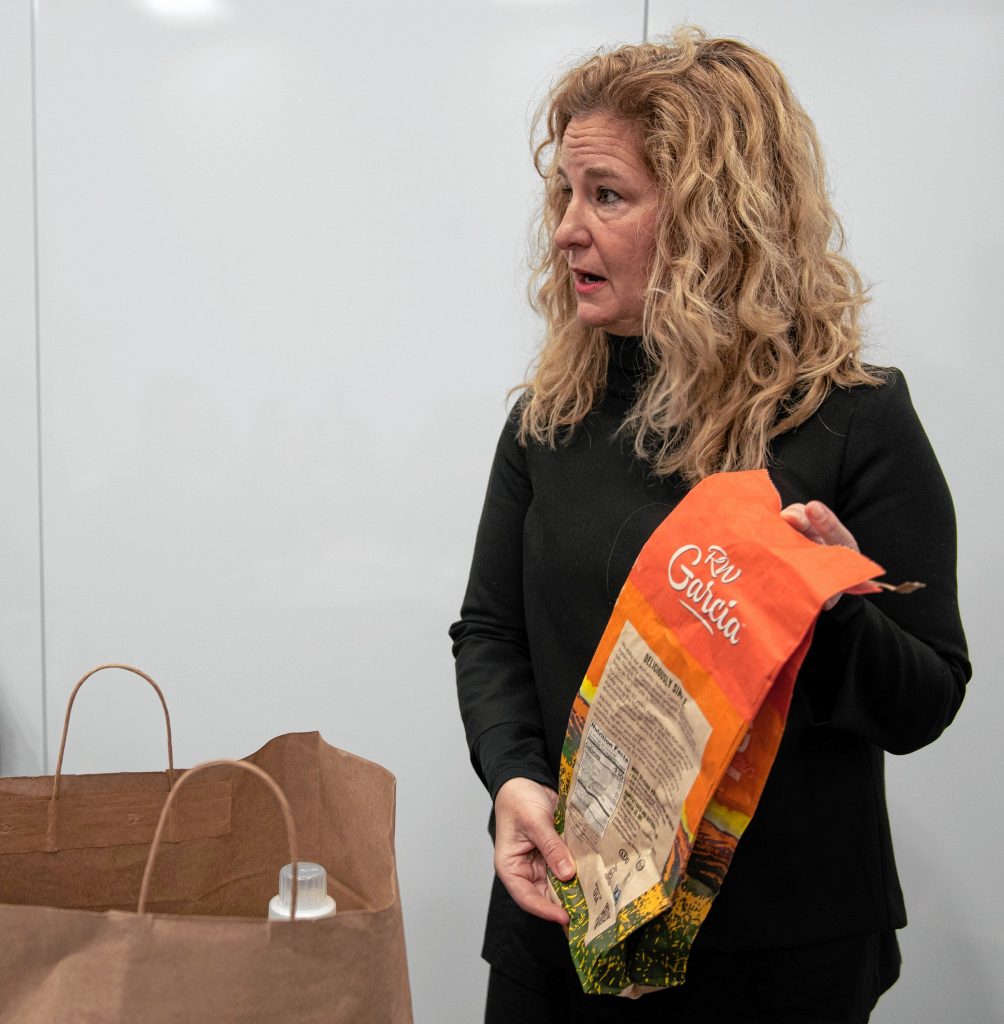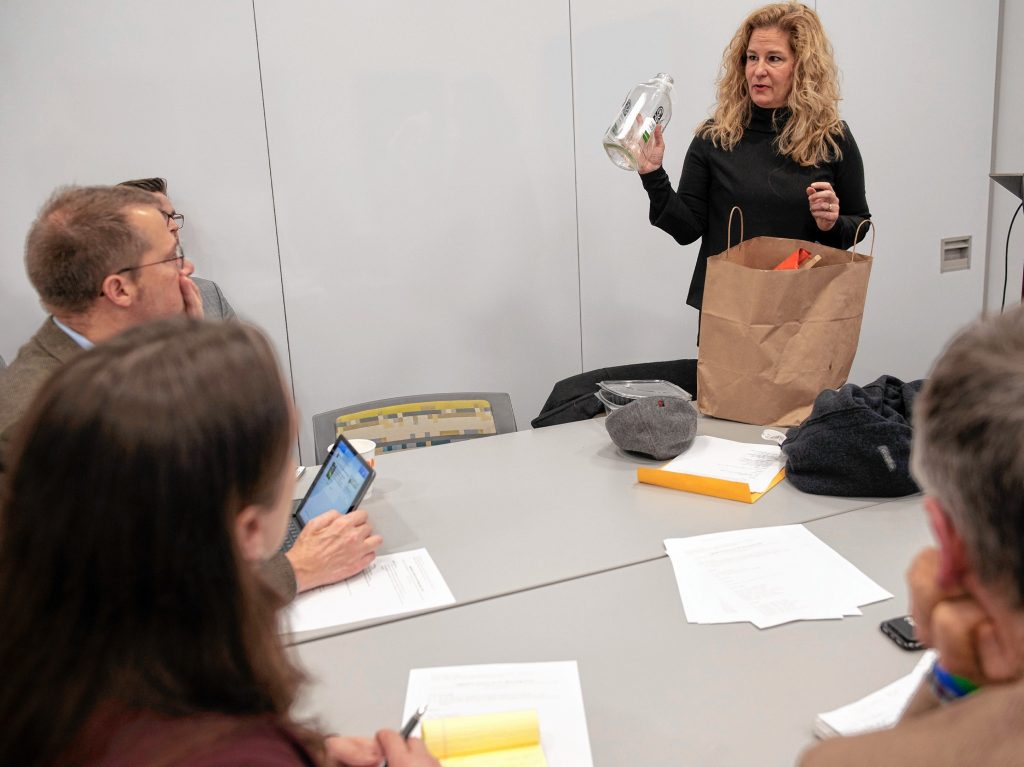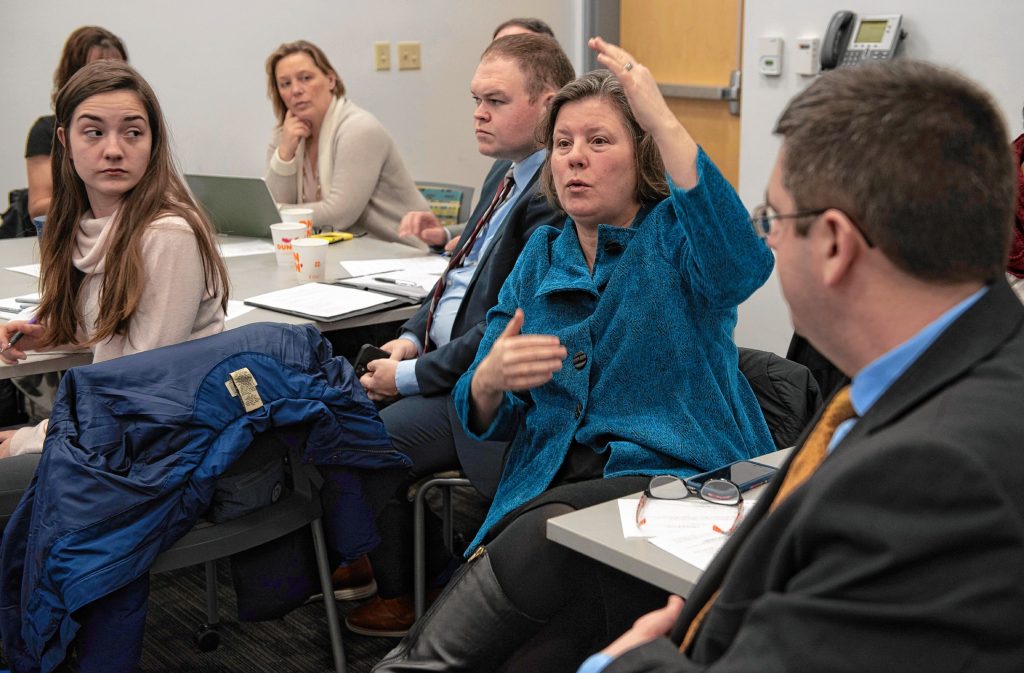For three years, since China instituted stricter purity standards in the recyclable materials they accept, a single piece of paper has shielded most Western Mass communities from the higher price of recycling experienced in much of the country: a multi-year contract with the Springfield Materials Recycling Facility (MRF).
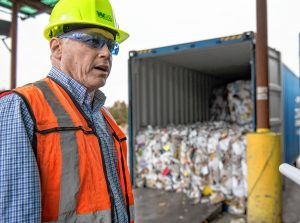
Waste Management District Manager Michael Moores gives a tour of the Materials Recycling Facility, which he manages, in Springfield on Tuesday, Feb. 4, 2020. Kevin Gutting photo
But come July 1, that contract will expire, and the region stands to be hit hard by that reality, according to Arlene Miller, the vice chair of the Springfield MRF Advisory Board. Located on Birnie Avenue in Springfield, the MRF is a public and private partnership between the Massachusetts Department of Environmental Protection (DEP) and Waste Management.
“Revenues are off about 60 to 70 percent,” said Michael Moores, plant manager for the Springfield MRF and an employee of Waste Management. Just a few years ago, recycled newspapers were worth between $85 to $90 a ton, but now are down to $10 a ton, he noted.
Revenue loss has up to now been absorbed by Waste Management, but that will change with the new Western Mass Regional Recycling Program contract, which municipalities must choose to accept by February 28, according to Miller.
That contract for the first time will include having to pay to haul away recycling, and, as they make their decision about whether to join, civic leaders are looking to state-level legislation to force large corporations producing recyclable materials to reimburse communities.
Questioning recycling
For Dara Herman Zierlein, an artist and activist from Northampton, reducing plastic has been her everyday commitment for the past 15 years. The Advocate ran a cover story on Zierlein last year about a children’s book she wrote called “Don’t Eat The Plastic” and her quest not to throw away any plastic.

Artist activist Dara Herman Zierlein talks about plastic waste, Thursday, Jan. 31, 2019, at her studio in Northampton.
She said she took the new realities of recycling hard.
“Through my process of trying not to have plastic at all in my life my carrying my own bottle and bringing my own bag and saying no to plastic at restaurants and all those things, I also had to find out, ‘Am I recycling correctly?’” she said.
Zierlein said she often hand washes plastic containers and checks to make sure the plastic that she’s placing in her recyclable bin can actually be reused.
Only 9 percent of plastic ends up being recycled, according to recent story by National Geographic titled, “A whopping 91 percent of plastic isn’t recycled.” During the past 60 years, 8.3 billion metric tons of plastic has been created around the world with most of it ending up as trash.
Zierlein said she thinks China’s new purity standard rate might spur Americans to take a closer look at the waste they produce.
“We’ve got to find new solutions to our waste,” she added. “Nobody likes to have to pay more money for anything, not a homeowner. I don’t want it to cost me more with my waste, you bet I’m going to eliminate my waste. I’m going to think twice; maybe I should walk into town to eat out instead of picking up because those containers add up.”
A look inside
Inside the Springfield MRF earlier this month, the plant’s manager, Moores, pointed to 1,110 pounds of aluminum cans compressed into a square bale stacked beside dozens of other bales, which he said had been collected from communities across Western Massachusetts.
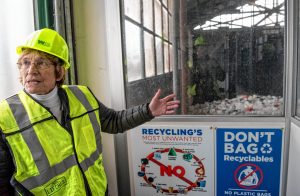
Arlene Miller, vice chair of the Springfield Materials Recycling Facility Advisory board, talks about plastics from the observation deck of the MRF on Tuesday, Feb. 4, 2020. Kevin Gutting photo
Over the distant roar of machinery, Moores explained that the facility includes two buildings — one for paper products and another for commingled material (glass, plastic, as well as metals such as aluminum or tin). The Springfield MRF processes what is called “dual-stream” recycling, according to Moores. That means as opposed to “single-stream” operations, which combine paper with other materials, they are kept separate at the MRF.
Thousands of plastic pieces, aluminum cans, and other recyclable material formed a small hill-like pile at the Springfield MRF as a loader pushed more recyclables into the heap. While watching the scene, Miller explained that some of the material such as plastic-lined paper bags, Christmas lights, plastic cups, styrofoam, pots, pans, and ropes, often make their way into the recycling stream, but aren’t recyclable.
One of the benefits of dual stream recycling is that the contaminant rate (in which non-recyclable trash is included with recycling) is lower than single-stream. Typically, single-stream includes a 10 to 15 percent contamination rate, Miller, the vice chair of the Springfield MRF Advisory Board, said.
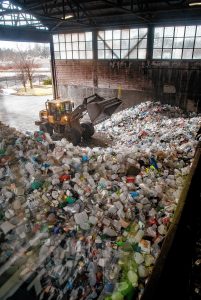
A frontloader consolidates a mound of plastic at the Springfield Materials Recycling Facility on Tuesday, Feb. 4, 2020. Kevin Gutting photo
In contrast, at the dual stream facility in Springfield the rate was only 3.3 percent in 2019, she noted.
“They’re not embarrassed by 15 percent, that’s the best they can do,” she said of single-stream recycling. “We’re embarrassed if it’s above 5 percent.”
Despite the financial impacts that will be facing communities in western Massachusetts, Miller thinks it’s important to remember why people started recycling in the first place.
“It’s good for the environment. The idea is to have higher and better materials than using virgin materials and just throwing them away. This way, they can be circulated through the economy over and over again and save natural resources,” said Miller, who previously worked for 20 years as the western Massachusetts municipal assistance coordinator for DEP before retiring three years ago.
Don’t cross the streams
About half of the region’s annual recycling — around 20,000 tons — comes from single-stream recycling, Moores said. The rest is from dual-stream.
The Springfield MRF is the only recycling facility in the state that focuses on dual-stream recycling, Moores said.
“There’s not a lot of us left,” he added. “There was a big switch over to single-stream over the last 10 years.”
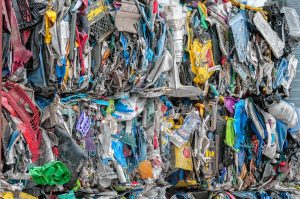
Bales of rigid plastics stacked at the Springfield Materials Recycling Facility on Tuesday, Feb. 4, 2020. Kevin Gutting photo
The single-stream material is dropped off at Automated Materials Handling on Tremont Street in Springfield and shipped to markets in the eastern half of the state or Connecticut, Miller said.
Due to the current contract many Western Mass communities have with the Springfield MRF, those communities have been shielded by the increasing recycling costs. But in other states and East of the Quabbin Reservoir, communities have been paying between $80 and $130 a ton for recycling during recent years, Miller said.
Communities that use single-stream recycling, including Agawam have already signed on to the new Springfield MRF contract. The three-year agreement contains a processing fee of $145 per ton during the first year, $148.63 per ton during the second, and $152.34 per ton during year three, according to a Oct. 15, 2019, letter from the Springfield MRF.
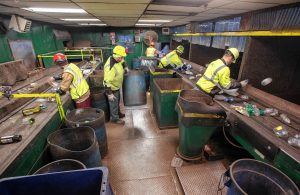
Workers separate different materials in the sorting room of the Springfield Materials Recycling Facility on Tuesday, Feb. 4, 2020. Kevin Gutting photo
The majority of communities in western Massachusetts use dual-stream recycling, and for those communities they have until February 28 to sign a five-year agreement with the Springfield MRF. Processing fees are lower for dual-stream recycling: $93.50 per ton for the first year, increasing to $95.84 per ton in the second year, $98.23 per ton in the third year, $100.69 per ton in the fourth year, and $103.21 per ton during year five.
The new contracts require municipalities to cover the processing fees up front, but also includes a possible reduction in cost based on monthly market revenue of recycled material, according to the letter.
“There is now a processing fee associated with that contract and then a revenue share offset to the processing fee,” Miller added. “Historically, we’ve had no processing fee. It’s just been the risk of the operator of the facility. And because the market’s been so lucrative, they’ve made off well over the course of the 25 to 30 years they’ve been operating it. But in the last two years, they’ve taken some financial hits because of the contract we have currently.”
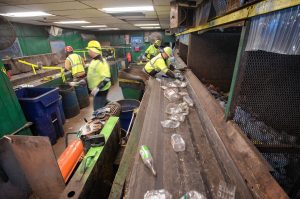
Workers separate different materials in the sorting room of the Springfield Materials Recycling Facility on Tuesday, Feb. 4, 2020. Kevin Gutting photo
Town and city leaders across western Massachusetts are still weighing their options in regards to the contract. In the city of Holyoke, Mayor Alex Morse has been looking at alternatives to Springfield MRF with other private companies such as USA Recycling, Casella Waste Systems, and NH-based nonprofit Northeast Resource Recovery Association.
“I think what’s important for Holyoke residents to know — and I believe the majority of residents across Western Mass — is that in terms of recycling, not much will change,” he explained. “I think we still have an obligation and a responsibility to continue the service regardless of the cost.”
Northampton Mayor David Narkewicz said his city would likely have to pay less than $100,000 in the first year for recycling with the new Springfield MRF contract. The city of Northampton attempted to explore alternatives, but found that the most affordable option is likely to sign the new contract.
Narkewicz said Northampton operates a transfer station that’s utilized by half of the city’s residents. The other half rely on private vendors for curbside trash and recycling pick-up.
Funding for the transfer station isn’t operated through the city’s general fund and is set up as an enterprise fund. There’s an annual fee for residents to recycle at the transfer station, and the fee could go up.
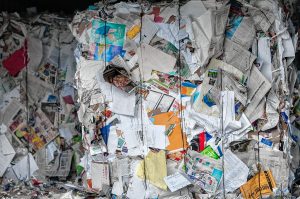
Bales of paper stacked at the Springfield Materials Recycling Facility on Tuesday, Feb. 4, 2020. Kevin Gutting photo
“We might need to look at that pricing structure if the cost of recycling is going to climb,” Narkewicz said. “This is a self-sustained enterprise fund, so it has to be a self-sustaining operation. We may need to look at that going forward.”
Narkewicz said the city is committed to staying a leader in the Pioneer Valley when it comes to promoting recycling and reuse.
“We’ve been running a number of programs in the city. We have a dedicated recycling and reuse coordinator who leads a group of citizen volunteers who run all sorts of special programs,” he added. “They’re doing repair clinics to try to encourage people who have broken appliances to fix them rather than tossing them to the waste stream.”
Unlike Northampton and Holyoke, the town of Agawam is a single-stream recycling community. Agawam Mayor William Sapelli said he expects that the municipality will pay more than $100,000 for its recycling this year.
The biggest question that residents ask him in regards to the changes to recycling is whether the number of trash and recycling pick-ups will change.
“That is not something that’s going to happen, certainly in the short-term,” Sapelli explained. “The other question they have is, ‘If we have this additional expense that we weren’t expecting that has to be put in the budget, will our taxes go up exponentially?’ My answer to that right now is, ‘No.’”
Sharing the costs with corporations
State legislative officials, local elected leaders, and members of the Conservation Law Foundation gathered on Feb. 10 at the Massachusetts Green High Performance Computing Center in Holyoke to look at the future of recycling not just in western Massachusetts, but across the state.
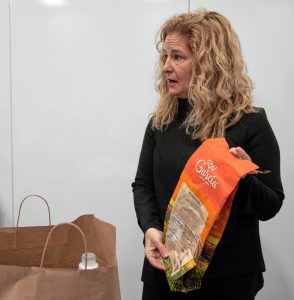
Kirstie L. Pecci, the senior Fellow for Conservation Law Foundation, speaks to a group of state legislatures, during a regional recycling legislation meeting. Carol Lollis photo
John Hite, a policy analyst with the Conservation Law Foundation’s Zero Waste Project, said two bills at the state level could offer communities across Massachusetts relief from the fiscal impact of recycling costs as well as expand recycling efforts and bring about more accountability for corporations producing recycled material by reimbursing communities.
“An Act to save recycling costs in the Commonwealth” (H.750), sponsored by State Rep. Michael Day (D-Stoneham), would require companies that manufacture consumer goods and make more than $100,000 a year in sales to contribute to a fund to reimburse communities for recycling costs.
According to the bill, no producer would be allowed to sell any packaging materials in the commonwealth unless approved by the Sustainable Packaging Advisory Board two years after the bill passes. Each town or city in the state would submit a report to the producer responsibility organization created after the bill is passed to document monthly tonnage and cost of recycling collected by the municipality.
Communities in Massachusetts would receive 60 percent reimbursement if contamination is above 10 percent and 80 percent reimbursement if contamination is below 10 percent, the bill states. Each municipality would also be required to develop and submit a zero-waste plan outlining how they would reduce their waste in the future.
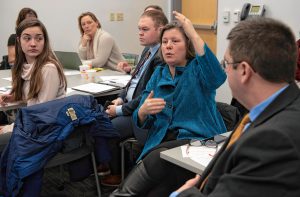
Jo Comerford asks a question at the regional recycling legislation meeting in Holyoke Monday morning. Carol Lollis photo
“All these big companies — Coca Cola, Nestle — they’re making these grand projections that by 2050 they want to have 100 percent recyclable material and they want to have 50 percent recycling of their packaging. Well, they’re not going to get there without programs like this. Absolutely not. When they oppose bills like this, and they do and they will, it really calls into consideration how dedicated are they really to those goals,” Hite said at the meeting.
He added the bill would generate additional funds in the recycling system, which could be used to create grants to improve composting, establish a regional MRF, or other strategic investments.
After the meeting, Narkewicz said he’s been a strong supporter of producer responsibility during the past decade, having testified for a previous bill focused on electronics.
“Extended producer responsibility is the way we need to go because we need to have a paradigm shift away from all these costs flowing to cities and towns to have to manage and having to manage them at the local level. That’s really the only way we’re going to encourage manufacturers to produce more environmentally responsible products and product packaging if they have to bear that cost. Right now, they don’t have to bear the cost,” he said.
Morse said he thinks local taxpayers are carrying the costs that private corporations should be paying.
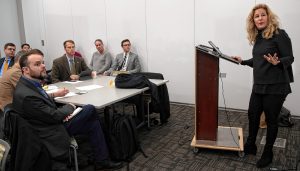
Kirstie L. Pecci, the senior Fellow for Conservation Law Foundation, speaks to a group of state legislatures, during a regional recycling legislation meeting. Carol Lollis photo
“The fact that we’re not putting any of the burden on corporations that are producing this and putting the burden on cities and towns and the taxpayers is a complete shame,” he added. “This is where the government has a responsibility to act and intervene … and get rid of these subsidies on the oil and gas industry, for the biggest producers of plastic,” Morse said.
The other bill, “An Act to create a deposit for glass wine and liquor bottles (S.2481),” sponsored by State Senators Patrick O’Connor (R-Weymouth) and Joan Lovely (D-Salem), would create a bottle deposit for glass wine and liquor bottles as well as soda water, mineral water, and other malt beverages.
In an interview with the Valley Advocate prior to the meeting, Agawam Mayor Sapelli said he supports the bottle bill and efforts to expand recycling.
“Especially those wine bottles,” he said. “Those things are heavy. Why can’t we recycle those things? Think about it. It’s such a waste. We’re such a wasteful society. Those should be recycled. That’s easy.”
State Rep. Lindsey Sabadosa said she supports both bills and believes they would lessen the impact of recycling costs on local communities.
“I think that they certainly will, particularly the producer responsibility legislation,” she noted. “That will certainly have an impact on municipalities. But the fact of the matter is we’re late to the game. Municipalities are going to have to end up bearing this cost, at least for this first year. And if we want to be really proactive and pass this legislation, we can stem that. Otherwise our cities and towns, as usual, are going to be picking up costs that our state government could really help them avoid.”
Chris Goudreau can be reached at cgoudreau@valleyadvocate.com.

